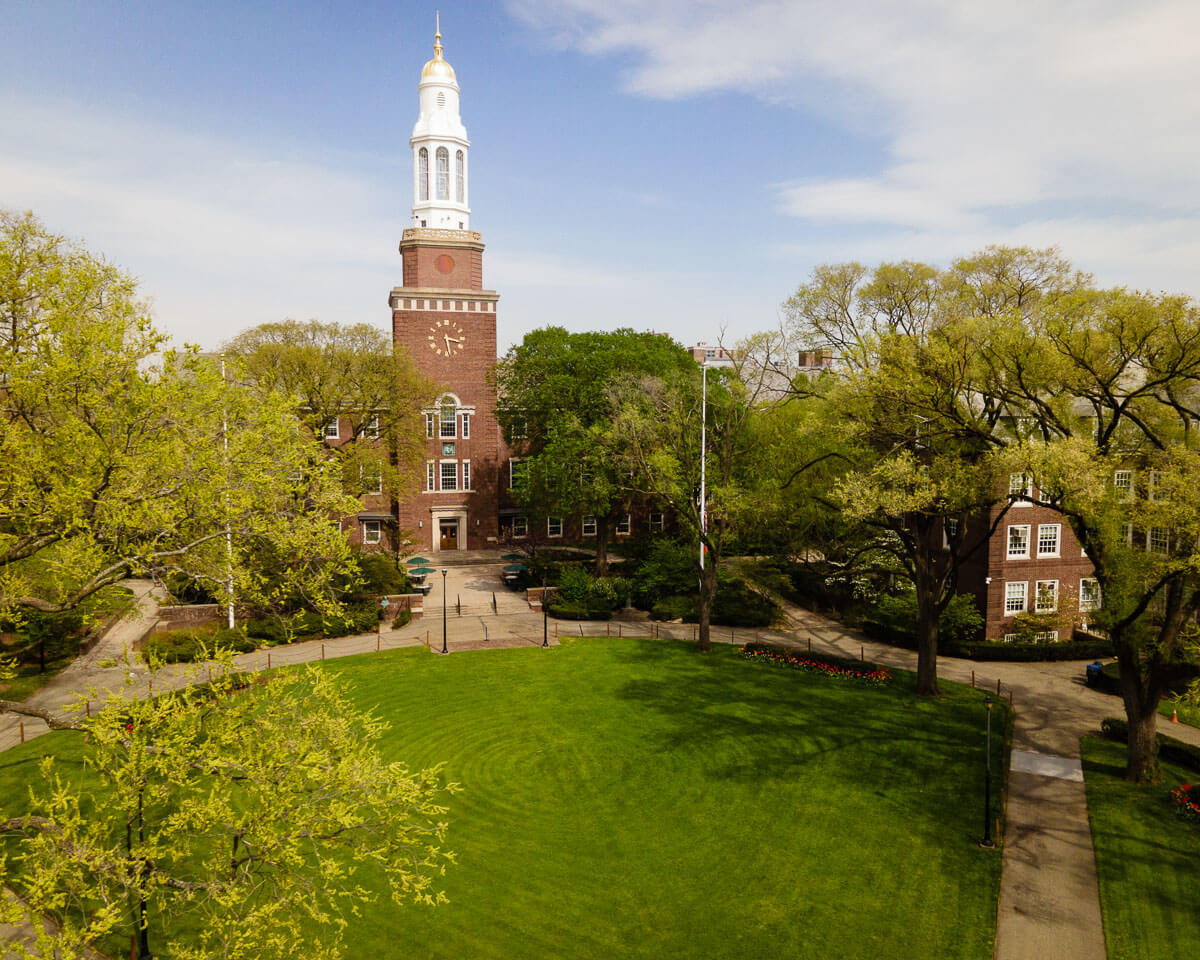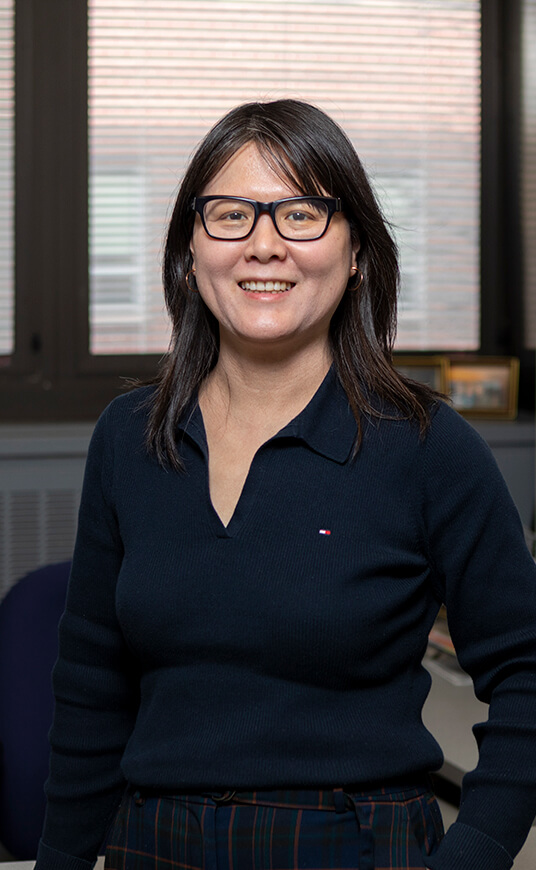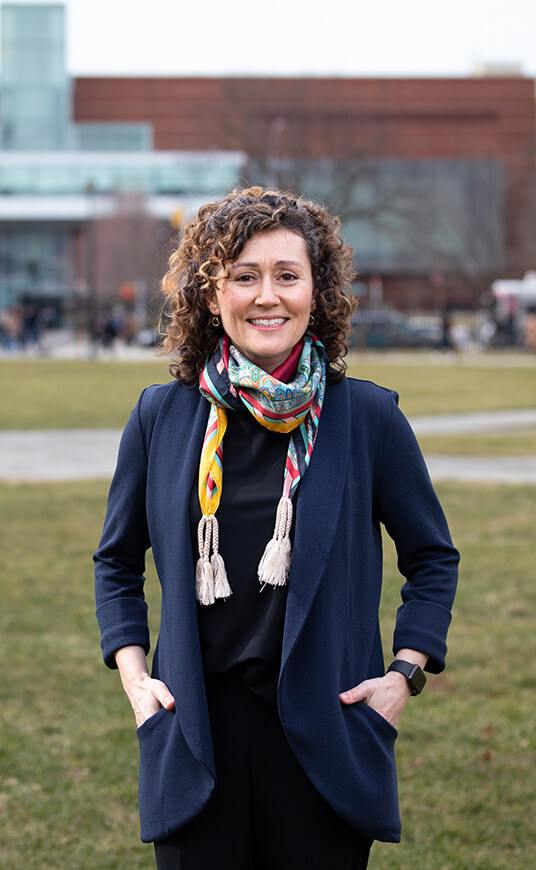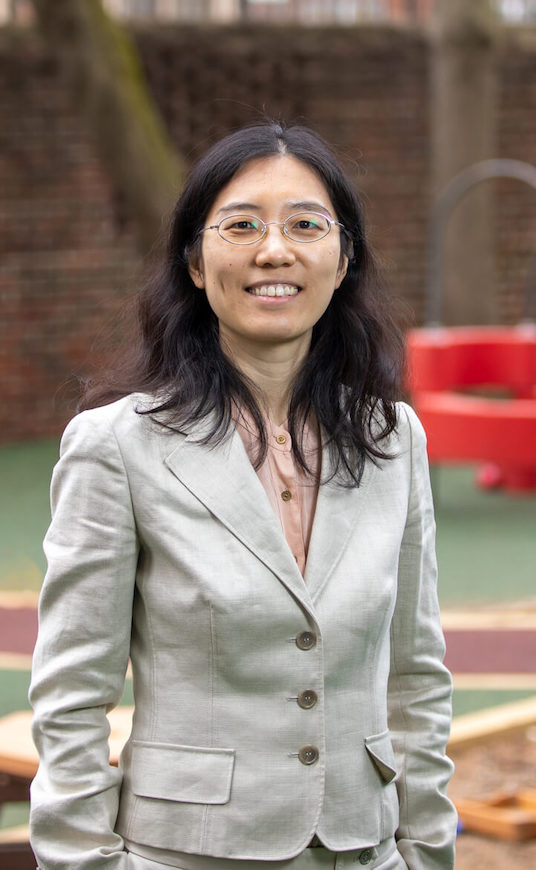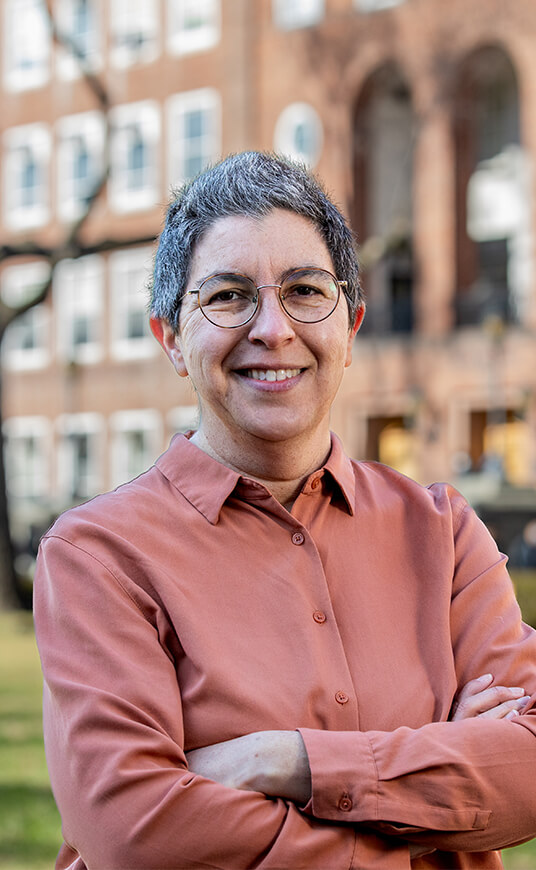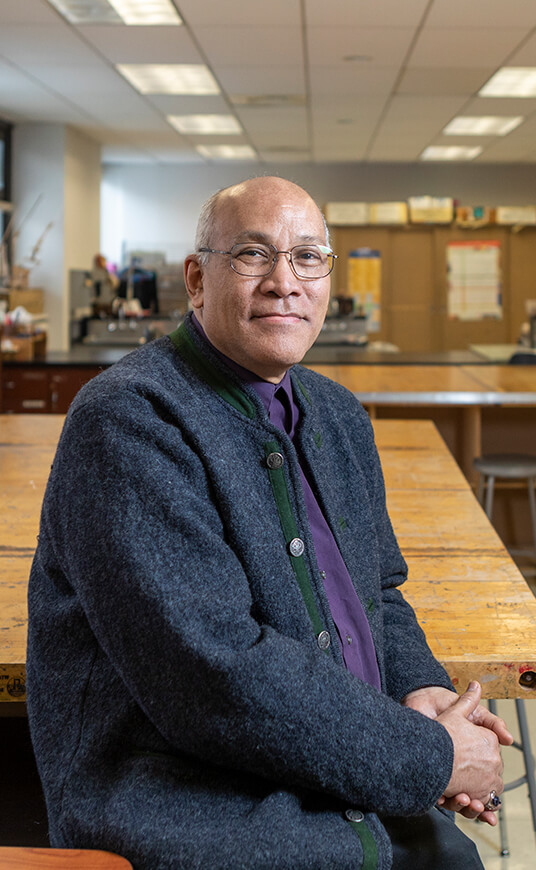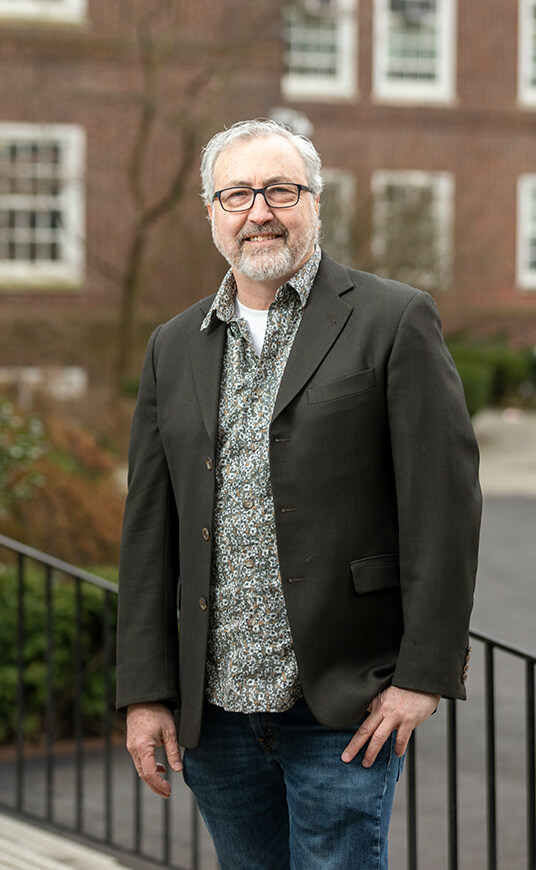Early Childhood Education Teacher (Birth–Grade 2), M.S.Ed. (Online)
School of Education
Program Overview
We prepare reflective teachers knowledgeable about child development (typical and atypical) within the contexts of culturally, linguistically, and socially diverse families, communities, and early-learning settings, including dual-language programs. Students develop curricula that ensure an equitable and positive outcome for all young children with and without disabilities and emergent bilingual/multilingual learners. Our graduates are keen observers of young children who document, successfully teach, and build on children’s strengths, using and advocating for inclusive, developmentally responsive, play-based, and culturally sensitive practices that are family centered and relationship based.
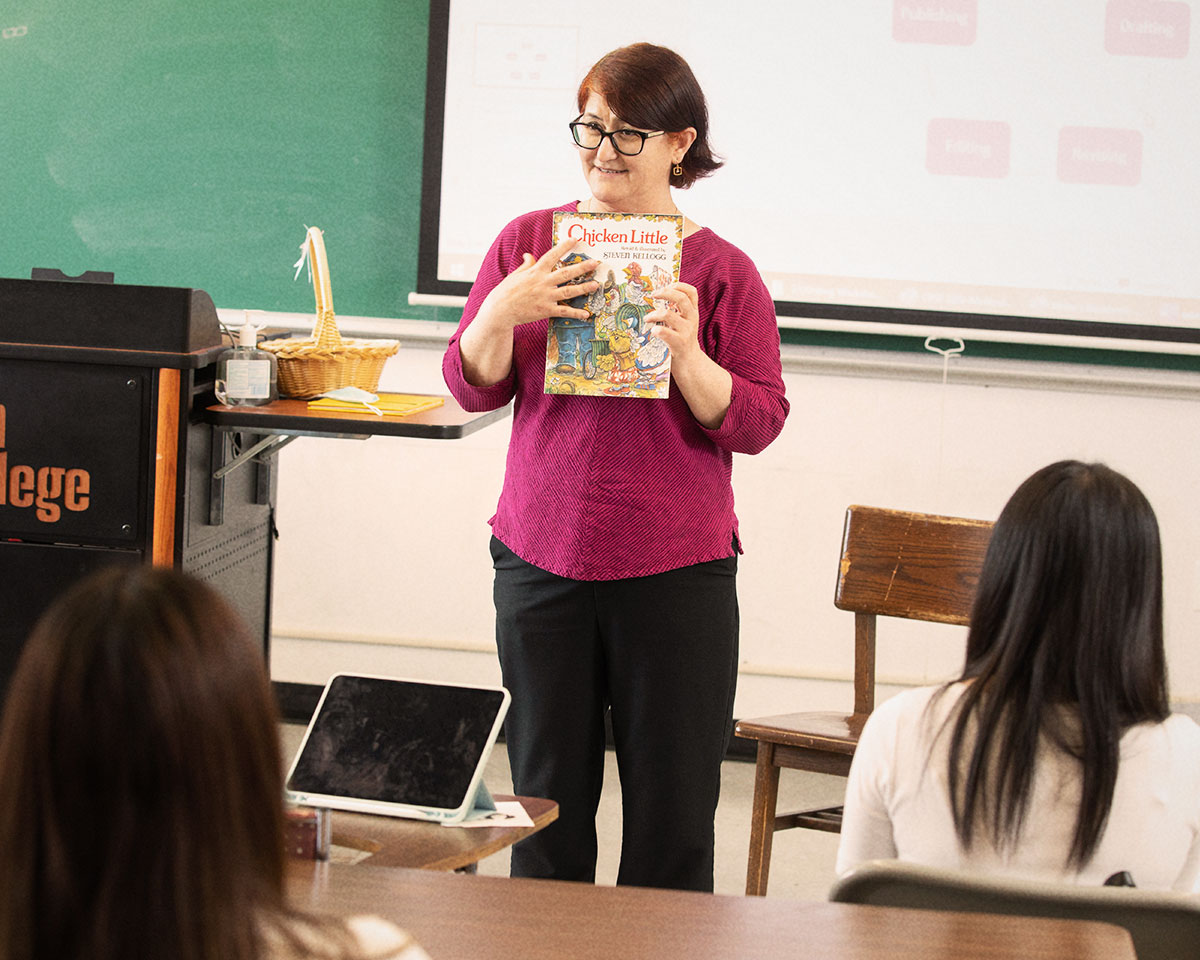
Program Details
The program information listed here reflects the approved curriculum for the 2024–25 academic year per the Brooklyn College Bulletin. Bulletins from past academic years can be found here.
Program Overview
The M.S. in early childhood education prepares reflective teachers of children from birth through grade 2. Courses taken within the degree program may lead to additional extensions and certifications (Bilingual Education in EC, Gifted Education in EC, EC Special Education), and an Advanced Certificate in Early Intervention and Parenting. See specific course requirements noted below.
Our Early Childhood Program considers child development (typical and atypical) within the contexts of culturally, linguistically, and socially diverse families, communities, and early learning settings, including dual language programs. Our graduates are keen observers of young children who document, successfully teach, and build on children’s strengths, using and advocating for inclusive developmentally responsive and culturally sensitive practices based on a family-centered and relationship-based philosophy.
Fundamental to the program’s philosophy, we believe children learn through their engagement in play and emphasize the development of anti-bias curriculum that is linguistically and culturally inclusive. With an emphasis on careful curriculum and environmental design, students develop curricula that ensure an equitable education and positive outcomes for all young children with and without disabilities and emergent bilingual/multilingual learners.
Based on the continual expansion of knowledge, our curriculum is vibrant and addresses emerging issues in the field. This includes bridging students’ fieldwork and clinical experiences with current theories and research in child development, infant mental health, and early childhood education. Our course work integrates the latest research in infancy and early relational health, neuropsychology, social and emotional development, parenting and family systems, trauma-informed care and reflective practice/supervision, curriculum design, authentic assessment, emergent bilingual language development, reading science, number development, science inquiry, and technology.
Students are encouraged to push the boundaries of what is known about child development and early childhood education. We prepare our students to teach in under-resourced communities through strong relationships with neighborhood early childhood programs and schools and our partnership with JumpStart, a nonprofit organization that recruits and trains college students to provide a rich literacy-based curriculum to preschool children and their parents, as well as the Reading Rescue Initiative, an evidence-based literacy intervention that students in our Early Childhood literacy courses are trained in and use to support a striving reader in the DOE.
EC faculty are actively engaged in designing and implementing research that supports under-resourced communities to address inequities in ways that translate into better academic, social-emotional, and physical outcomes for all children and families. Also, students and faculty are currently involved in international partnerships and research in China, India, and Sweden.
Students will enroll in the appropriate course of studies listed below (Option A or B or C) based upon teaching experience, previous course work, and the teaching certificates they hold.
Starting fall 2022, the course seminars/lectures for the program will be online; courses may require in-person fieldwork/student-teaching in early childhood settings.
Program Requirements (30–45 Credits)
During the first semester, students must file a program of study approved by the graduate early childhood education program coordinator. All courses in the early childhood degree sequence require departmental permission for registration.
Early Childhood and Art Education 7103T and 7110T are taken consecutively the last two semesters of the student’s program of study.
The department chair may allow substitutions for one or more of these requirements consistent with the educational goals of the program.
Students must obtain fingerprinting clearance and create a NY.gov TEACH account. Fieldwork/student-teaching in an early childhood setting requires students to be fingerprinted by New York City Department of Education and/or Department of Health Mental Hygiene’s Department of Investigation depending on the school/center requirement. Fieldwork/student-teaching in a DOE public school requires students to be fingerprinted by the New York City Department of Education (NYC DOE); see SOE website for more information.
Matriculation Requirements
Applicants must have a minimum undergraduate grade point average (GPA) of 3.00. A minimum GPA of 3.00 in graduate education courses is required to maintain matriculation.
International applicants for whom English is a second language are required to pass the Test of English as a Foreign Language (TOEFL) with a minimum score of 575 on the paper-based test or 233 on the computer-based test or 79 on the internet-based test, to be considered for admission. Applicants are interviewed and may be required to demonstrate written proficiency in English.
Students should note additional requirements found at the beginning of this section as well as in the sections “Admission” and “Academic Regulations and Procedures” of the Brooklyn College Bulletin of Graduate Programs.
Maintain matriculated status. Students must have taken and passed the following New York State exams at the specified transition points:
- CST-EC Arts & Sciences section: prior to completing 18 credits.
- The Educating All Students (EAS) exam: prior to completing 24 credits.
- The CST-EC Literacy and Math sections: prior to student-teaching.
- Throughout student-teaching, students complete and submit their final New York State certification exam, Teacher Performance Assessment (EdTPA), which involves submitting video clips of teaching, lesson plans, and other assessment material (see SOE website for additional information).
A student must complete student teaching with a B or higher. Students who receive a grade lower than a B must apply to the ECAE chair for permission to reregister to repeat student teaching. Students will be allowed to repeat an ECAE course (including student-teaching) only once.
ECAE students with a Transitional B certification or Internship License may need to take an additional one-credit course, ECAE 7001T and/or ECAE 7002T.
During the first semester, students must file a program of study approved by the Early Childhood Education program coordinator. All courses in the early childhood degree sequence, the early childhood bilingual extension, the early childhood gifted extension, and the early childhood students with disabilities extension require departmental permission for registration.
Note: Students not working toward certification must schedule a meeting with the graduate early childhood program coordinator to set up an alternative transition point plan during their initial semester.
Option A (30 Credits)
The following program applies to students who hold a New York State Initial Certificate in Early Childhood Education (birth through grade 2) or its equivalent. This program leads to a New York State Professional Certificate in Early Childhood Education (birth through grade 2).
Program Requirements
Students must complete 30 credits in the following courses:
Early Childhood and Art Education 7101T or 7683T; 7102T, 7114T or 7360T; 7107T; 7678T or 7359T; 7103T; 7110T; and four courses from the following: Early Childhood and Art Education 7013T, 7100T, 7104T, 7113T, 7111T, 7115T, 7116T, 7108T, 7105T, 7106T, 7104T, 7109T, 7359T, 7360T, 7361T, 7382T, 7383T, 7540T, 7551T, 7562G, 7563G, 7564G, 7568G, 7652T, 7663T, 7667T, 7668T, 7669T, 7670T, 7675T, 7682T, 7683T, 7695T, 7820T, 7885T, 7886T, 6002T, 7001T, 7002T or Puerto Rican and Latino Studies 7145X.
Option B (33 Credits)
The following program applies to students who hold a New York State Initial Certificate in Childhood Education (grades 1–6) or its equivalent or a New York State Initial Certificate in Special Subjects (all grades) or its equivalent. This program leads to a New York State Professional Certificate in Early Childhood Education (birth through grade 2).
Program Requirements
Students must complete 33 credits in the following courses:
Early Childhood and Art Education 7101T; 7102 or 7360T; 7675T, 7682T or 7013T; 7104T; 7107T; 7111T, 7115T, 7663T or 7383T; 7116T, 7108T, 7105T, 7106T, 7652T, 7109T, 7113T, 7678T, 7001T or 7002T; 7120T; 7103T; 7110T.
Option C (45 Credits)
The following program applies to students who do not hold a New York State Initial Certificate in Early Childhood Education or Childhood Education or Special Subjects or equivalent course work and teaching experience, or who are teaching but do not hold initial certification. This program leads to both New York State Initial and Professional Certificates in Early Childhood Education.
Program Requirements
Students must complete 45 credits in the following courses:
Early Childhood and Art Education 7675T, 7013T or 7862T; 7101T; 7102T or 7360T; 7103T; 7104T; 7105T, 7106T, 7652T, or 7540T; 7107T; 7108T; 7109T; 7110T; 7111T or 7663T; 7115T; 7116T; 7120T.
Additional Information
Requirements for the Extension in Bilingual Early Childhood Education
The New York State Education Department Extension in Bilingual Education may be added to the base of an early childhood teaching certificate by meeting New York State Education Department criteria for the Bilingual Extension. New York State requirements for the Early Childhood Bilingual Extension includes the following coursework: Early Childhood and Art Education 7100T, 7116T, 7359T, and 7361T; and 7360T or Puerto Rican and Latino Studies 7145X.
Permission from the graduate early childhood education program coordinator is required.
Nonmatriculated Students
Students with a New York State Initial Certificate in Early Childhood Education and/or a New York State Professional Certificate in Early Childhood Education or their equivalents who wish to complete an Extension in Bilingual without completing a master’s degree in Early Childhood Education, may do so as a nonmatriculated student. The Bilingual Extension in Early Childhood Education consists of 15 credits. The required courses, which may be taken in any order include: ECAE 7100T, 7116T, 7359T, and 7361T; and 7360T or Puerto Rican and Latino Studies 7145X.
Permission from the graduate early childhood education program coordinator is required.
Requirements for the Extension in Gifted Education Early Childhood Education
The New York State Education Department Extension in Gifted Education may be added to the base of an early childhood teaching certificate by meeting New York State Education Department criteria that includes the following 12 credits of course work: Early Childhood and Art Education 7667T, 7668T, 7669T, and 7670T.
Permission from the graduate early childhood education program coordinator is required.
Requirements for the Extension in Students with Disabilities (SWD) in Early Childhood Education
The New York State Education Department Extension in Students with Disabilities may be added to the base of an early childhood teaching certificate by meeting New York State Education Department requirements that include 15 credits of coursework: Early Childhood and Art Education 7101T, 7102T, 7104T, 7113T, and 7678T.
Permission from the graduate early childhood education program coordinator is required.
Student Learning Outcomes
The student learning outcomes for the Early Childhood Education and Dual Early Childhood/EC Special Education programs are based on the National Association for the Education of Young Children (NAEYC) and Council for Exceptional Children (CEC) standards for Early Childhood Professional Preparation Programs.
Upon completion of their program of study in EC, candidates will understand and be able to:
1. Promote Child Development and Learning (NAEYC 1; CEC 1)
EC candidates will have a deep understanding of child development (typical and atypical). They will use their knowledge of development, young children’s characteristics and needs, and of multiple interacting influences on children’s development and learning to create environments that are healthy, respectful, supportive, and challenging for each child.
2. Build Family and Community Relationships (NAEYC 2)
EC candidates will know about, understand, and value the importance and complex characteristics of children’s families and communities. They will use this understanding to create respectful, reciprocal relationships that support and empower families, and to involve all families in their children’s development and learning.
3. Observe, Document, and Assess to Support Young Children and Families (NAEYC 3; CEC 4)
EC candidates will know about and understand the goals, benefits, and uses of assessment. They know about and use systematic observations, documentation, and other effective assessment strategies in a responsible way, in partnership with families and other professionals, to positively influence the development of every child.
4. Use Developmentally Effective Approaches (NAEYC 4; CEC 2)
EC candidates will understand and use positive relationships and supportive interactions as the foundation for their work with young children and families. Also, EC candidates know, understand, and use a wide array of developmentally appropriate approaches, instructional strategies, and tools to connect with children and families and positively influence each child’s development and learning, including children with special needs.
5. Use Content Knowledge to Build Meaningful Curriculum (NAEYC 5; CEC 3)
EC candidates will understand the importance of developmental domains and academic (or content) disciplines in early childhood curriculum. They will know the essential concepts, inquiry tools, and structure of content areas, including academic subjects, and can identify resources to deepen their understanding. EC candidates will also use their own knowledge and other resources to design, implement, and evaluate meaningful, challenging curriculum that promotes comprehensive developmental and learning outcomes for every young child, including children with special needs.
6. Become an Early Childhood Professional (NAEYC 6; CEC 6)
EC candidates will identify and conduct themselves as members of the early childhood profession. They will know and use ethical guidelines and other professional standards related to early childhood practice. They are continuous, collaborative learners who demonstrate knowledgeable, reflective and critical perspectives on their work, making informed decisions that integrate knowledge from a variety of sources. They are informed advocates for sound educational practices and policies.
7. Respond to Linguistic and Cultural Diversity (NAEYC, 1995)
EC candidates will accept the legitimacy of children’s home language, respect (hold in high regard) and value (esteem, appreciate) the home culture, and promote and encourage the active involvement and support of all families, including extended and nontraditional family units.
8. Engage in a Variety of Early Childhood Field Experiences (NAEYC 7)
Through planned and sequenced field experiences, EC candidates will develop the knowledge, skills, and professional dispositions necessary to promote the development and learning of young children with and without special needs, across the entire developmental period of early childhood (birth to second grade) in multiple early childhood age groups and in the variety of settings that offer early care and education.
Admissions Requirements
- Fall Application Deadline—May 1
- Spring Application Deadline—November 1
Supporting Documents for Matriculation
Submit the following documents to the Office of Graduate Admissions:
- Transcripts from all colleges and universities attended. Applicants who earned a bachelor’s degree outside the United States need to submit a Course by Course International Transcript Evaluation. See Graduate Admissions for more information.
- Two letters of recommendation
- Résumé
- Photocopy of New York State (if applying for Option A) or other state teaching certificate
- A brief biographical statement of 500 to 1,000 words describing your reasons for pursuing the specific graduate program to which you are applying and your future professional goals.
The same requirements apply to nondegree applicants.
Required Tests
- F-1 or J-1 international students must submit English Proficiency Exam. TOEFL—79, IELTS—6.5, PTE—58–63, Duolingo—105–160.
All students accepted in to the School of Education are required to submit fingerprint verification before signing up for most education classes. Fingerprint verification is required for work in New York City Department of Education schools if you already have fingerprint records or not. Follow these instructions.
Refer to the instructions at Graduate Admissions.
Contact
Lulu Song, Early Childhood Graduate Deputy
2309 James Hall
E: ECgrad@brooklyn.cuny.edu
P: 718.951.5205
Or contact:
Office of Graduate Admissions
222 West Quad Center
2900 Bedford Avenue, Brooklyn, NY 11210
E: grads@brooklyn.cuny.edu
P: 718.951.4536
Office Hours
Mondays–Fridays, 9 a.m.–5 p.m.
To make an appointment with a graduate admissions counselor, visit:
The Support You’ll Find
Brooklyn College is an integral part of the cultural and artistic energy of New York City. Our faculty members in the Department of Early Childhood Education/Art Education offer incomparable expertise and tremendous talent, and each brings a unique perspective to their teaching and mentoring in and out of the classroom.
Internships and Employers
Students complete internships in public and private schools throughout the New York City region as well as across the United States. The internship is a supervised experience designed to hone the requisite skills and knowledge to work as a teacher.
